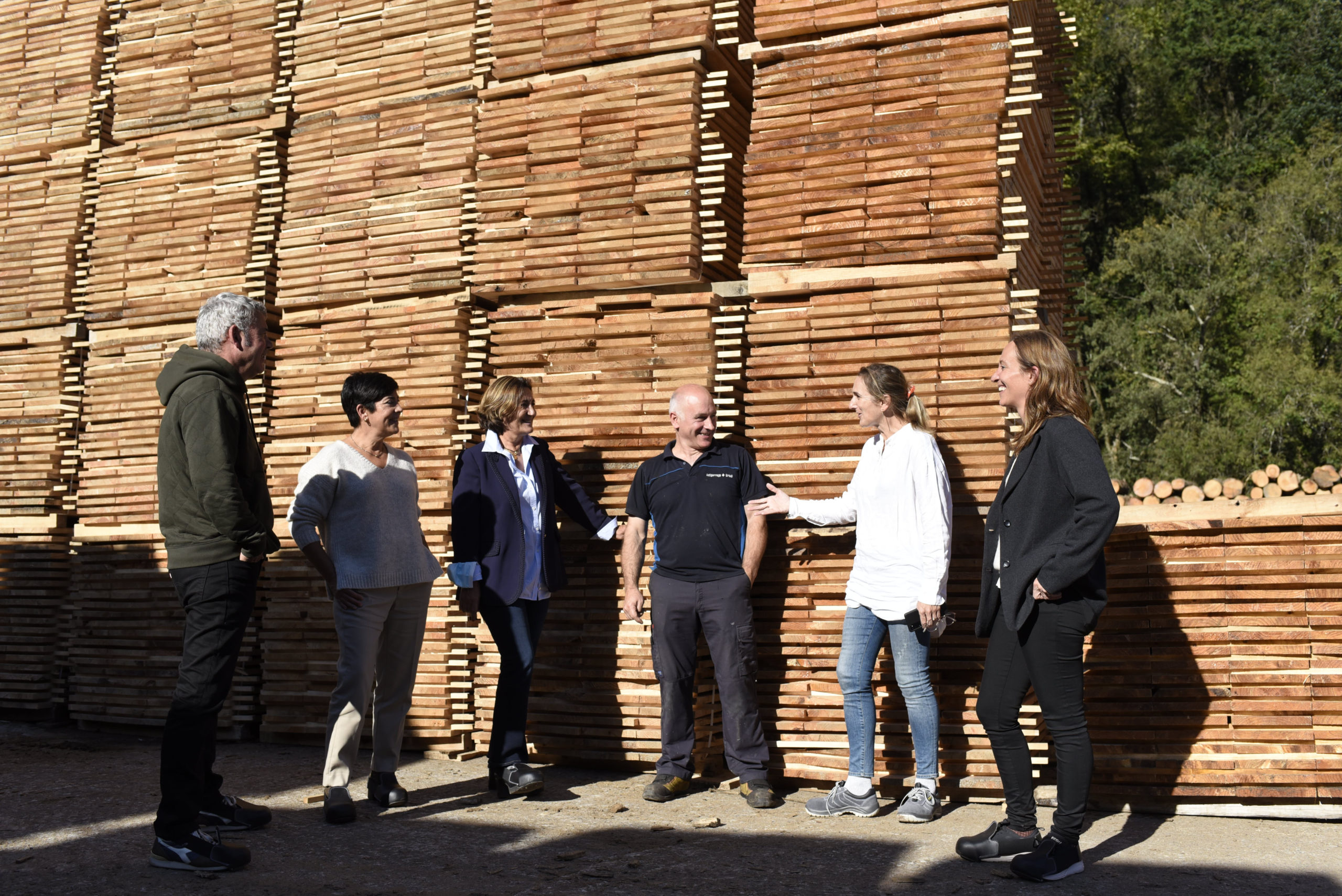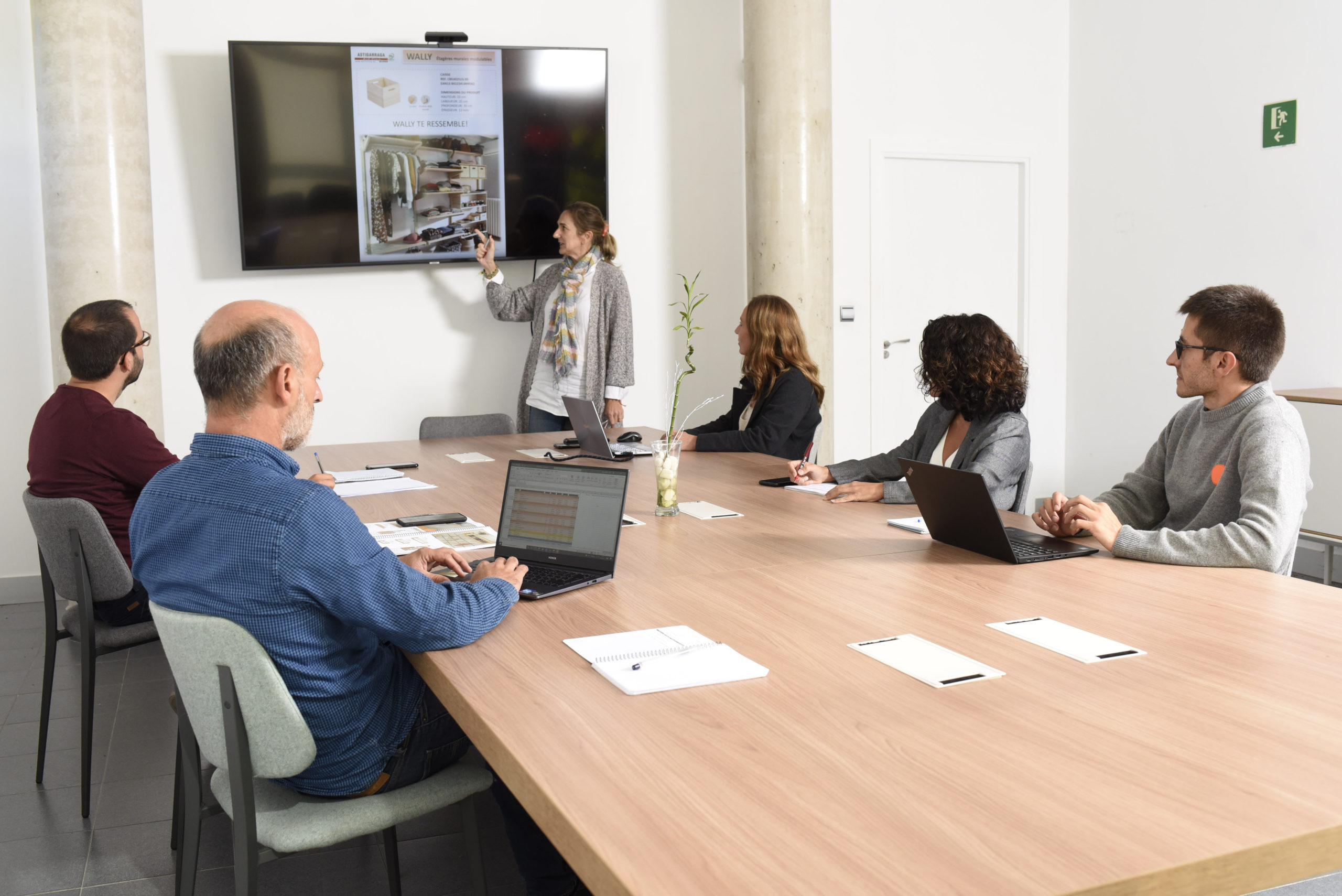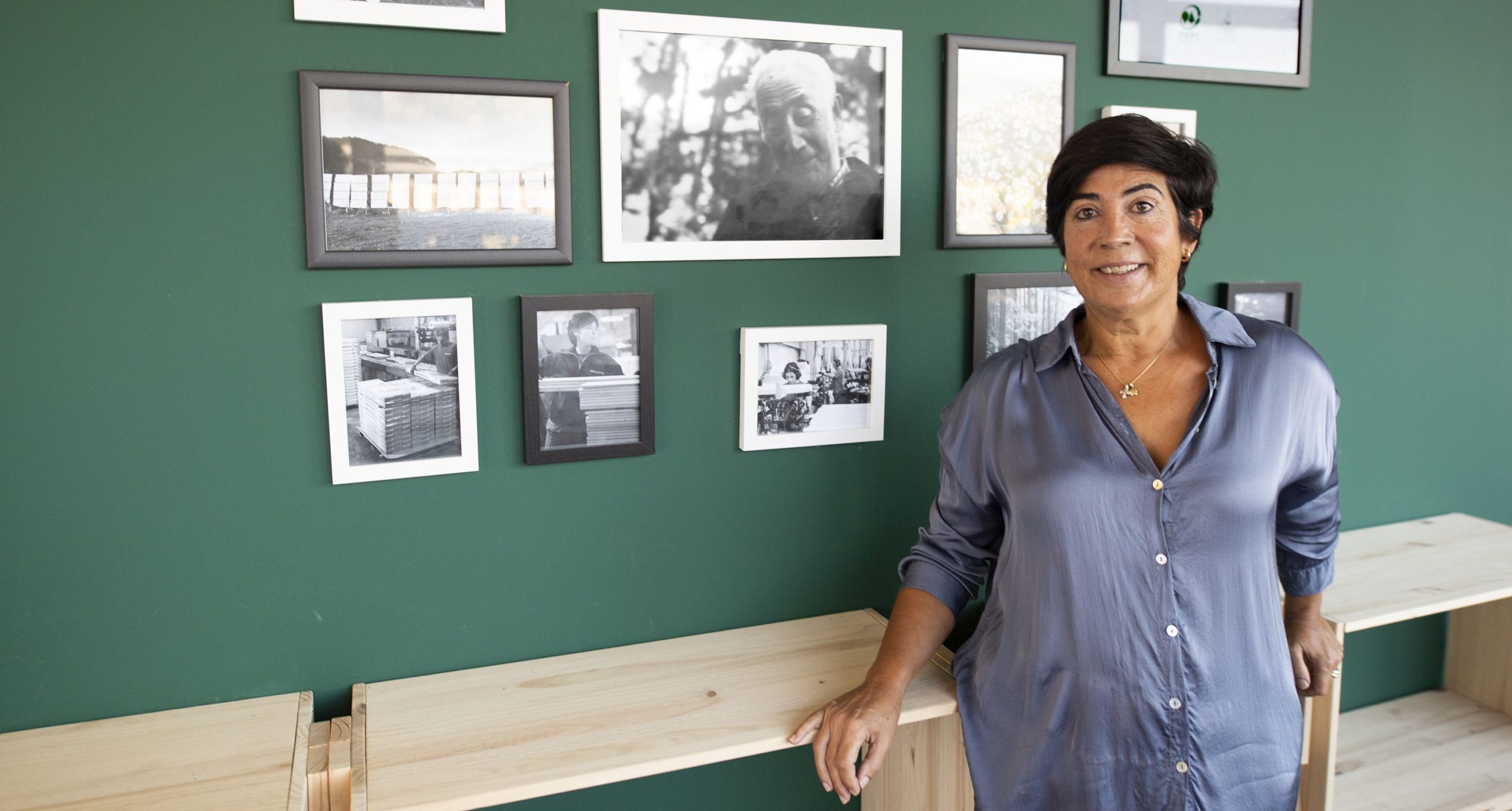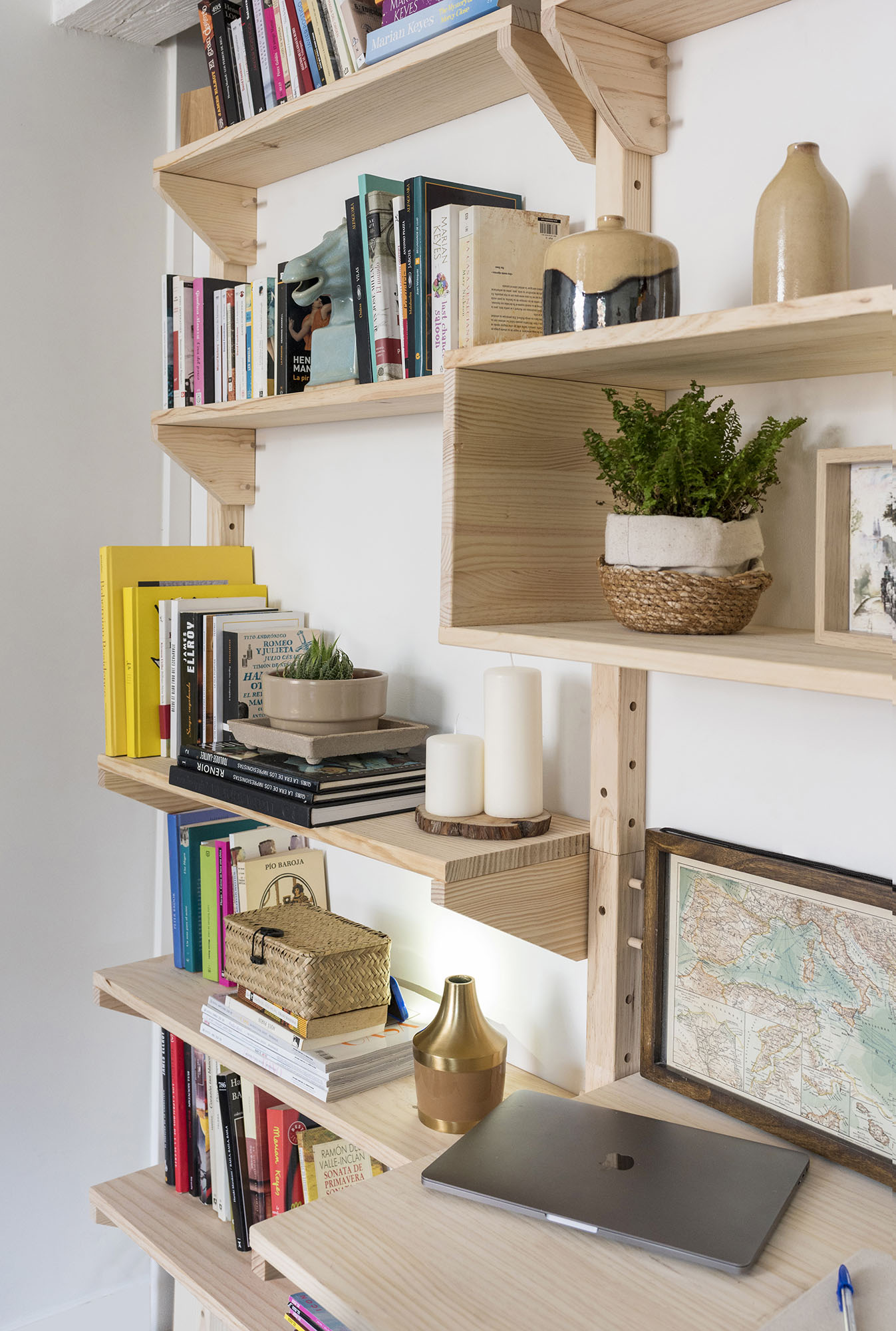From a small town in the heart of Gipuzkoa, Urrestilla, to the world. Jaione Badiola, an industrial engineering graduate of the University of Navarra and with a Master’s in Industrial Project Management from the University of Mondragon, has now been managing Astigarraga Kit Line for six months. But before coming to Azpeitia, her professional career took her to Poland, Brazil, France and China. Married with two children, she’s just as at home donning a safety helmet to tour the company’s trestle manufacturing plant as she is putting on her trainers and leggings to run the San Sebastian lilathon or sitting down with her children to help with their homework.
Today, International Women’s Day, is a good day to introduce you to Jaione Badiola, an empowered woman, dedicated to her family and passionate about all the projects that have landed in her hands. She is now advocating for attracting the best human talent and introducing automation, industrialisation and digitalisation in all of Astigarraga Kit Line’s production processes.
-Briefly summarise your professional career for us.
-After studying Engineering and carrying out my final project with a Socrates Scholarship in Birmingham, I was offered the opportunity to go to Fagor Electrodomésticos in Poland, as a manufacturing engineer. I landed in Wrocław the day after the Twin Towers fell in New York. I was there for 8 years, starting as a manufacturing engineer and then moving to R&D&I management. I married a Polish man in Urrestilla and we had our first child, then when I was pregnant with my second, we decided that our time in Poland had come to an end.
-And from Poland to France…
-Within the same Fagor Electrodomésticos group, we went to Orleans. When my second child was three months old, I started in the role of Quality Systems Manager at Fagor Brandt. Later, I had the opportunity to lead the Group’s Quality Systems management. We spent four years in France and once that time was over, the opportunity came up for Cikautxo in Brazil.
-Did you make the leap to another continent?
We embarked on a joint venture between a local Brazilian partner and Cikautxo: Paranoa, a company manufacturing products for the automotive industry. We spent three years in Diadema, near São Paolo, until the general manager offered me the chance to go to China, as manager of the Cikautxo subsidiary.
In June 2019, we made that family decision because it was time for my husband to take advantage of an opportunity that came up for him to be an airline pilot for a Polish company based in Germany. Until then, my husband had decided to accompany me and we always prioritised my professional projects. But, at that point, we decided that we could balance him spending two weeks in Germany and two weeks in China. We made the decision because you have to take opportunities when they happen, not when you want them. As a family, we were used to managing each other’s comings and goings. We spent five years in China and, in July 2021, we decided to return to San Sebastián.
-What made you return to your roots? Did Covid contribute?
-The four of us spent Christmas in Shanghai and New Year in Vietnam and we agreed with my parents that for the Chinese New Year, in February 2020, the six of us would be in Tenerife. There was already talk that there was Covid in China, but it was confined to Wuhan. We arrived in Tenerife and, on January 28th, the crisis in China began. I got a call from the company saying that the authorities were closing the plant and that returning to work would not be possible. We had our return tickets booked for the first week of February but the company cancelled them. My husband had to go to Germany and we managed to fly on February 10th, but they made us stay at home, they would not let me go into the company, so I decided to come back because the uncertainty was so great that I wanted to be with my family in San Sebastián.
While we were here, the Chinese authorities cancelled all our visas and would not let us enter China. In the end, we managed to get the documentation for my two children and me to fly to Shanghai on July 31st, 2020. After about 32 hours we arrived home, we did a 15-day quarantine, shut inside, and, from that day until July 2021, I could not see my husband and my children could not see their father. He was unable to enter Chinese national territory because his visa had expired and he was spending time between San Sebastián and Germany. With this in mind, we decided that family was very important, that our adventure in Asia was over and it was time to return to our homeland. We did not want to abandon our roots or our family relationships. On July 3rd, 2021, we returned to Donostia.
Return to origins
-Eleven months apart and you decide to come and live in San Sebastián and work for a company in Azpeitia, 3 kilometres from where you were born. A fully-fledged return to your origins. How did you come to Astigarraga Kit Line?
That’s right! Who would have thought it? Once that decision was made, I began to look at what opportunities there were in the area for me to take on, if possible, management functions. I started this research from China and I met the person who was leading the search for new general management for Astigarraga Kit Line. We talked, I met with all the brothers, we hit it off and it fell into place.

-And you began work on September 9th, 2021. In the wood sector, which was completely new to you…
-My professional career began in the household appliance sector, then I moved to the automotive sector, and now I am in the wood sector, but also still in retail. So the wood sector is new to me, but the industry is not new to me.
-What is your assessment of these past six months at Astigarraga Kit Line?
-Fantastic (she says emphatically). Tomorrow I will have been here for six months. First of all, personally, I am proud to be the managing director in Urrestilla, after I left this small town to go to university in Donostia and then never came back until now. It is a great satisfaction to see that by studying and making an effort you can achieve the challenges you set for yourself. Secondly, working with the Astigarraga Kit Line team is easy and pleasant. We have fascinating challenges ahead of us; they are not easy, much like in any sector, but with the human team we have, we are overcoming each one and we will face all the challenges we are setting ourselves.
-What challenges are you referring to?
-When I arrived at Astigarraga Kit Line, the company had already undergone several changes. It was a company that was dedicated to the manufacture of furniture and organisation products and to sales via the DIY channel and a little via the online channel. Due to certain circumstances, it moved to owning the wood sawing process. Industrially, it was an unknown process. And, without knowledge, it is difficult to do things right. When I started in September, despair and anguish were running high. Now it is March, and we have already internalised that the best thing that could have happened to Astigarraga Kit Line was having the opportunity to acquire this industrial process. It means we own the entire chain, upstream to downstream, involved in our process. This competitive advantage is invaluable. We have substantially improved our shortcomings, and we are on track, with continuous improvement, to make even more progress.
In addition, we have a team of people who hold a great deal of valuable knowledge and experience from working in this company. It was clear to us that we need to advance our systematisation and automation so that, with the same team, we can achieve even more than what Astigarraga Kit Line has achieved so far.
-You have started out with a lot of strength…
-If the leader does not have strength and passion, it is very difficult to pass that passion on to the team. I am delighted with the project I have in my hands. That is what it is all about: taking action, improving and overcoming the challenges we have set ourselves.
Circular economy
-Astigarraga Kit Line is a company that closes the manufacturing circle. Is this crucial to guarantee sustainable products?
-Astigarraga Kit Line is part of the so-called circular economy. We manufacture with Insignis pine logs from within a 40-kilometre radius around us. The wood comes from the forests of Gipuzkoa and Bizkaia. This means that we are using and consuming wood from our surroundings. The teams that extract the wood are from the region and our focus is always on collaborating with local suppliers. This company, from the very beginning, from the founder Juan Jose Astigarraga himself, has believed in the importance of the land and the concept of sustainability. We know that if we are not consistent with that, sooner or later problems will come. To ensure the sustainability and viability of the company, it is clear to us that this is the way forward.
Astigarraga Kit Line has PEFC certificates and the European Union Ecolabel. The commitment to sustainability is not a temporary trend, but is here to stay. There seems to be an ecological boom. But is the green concept being utilised well? Or is it being overexploited?
If we are committed to sustainability, there is no other way. I do not like to talk about what others may be doing, but instead about whether I am consistent with what we say or not. It is now becoming a reality that companies that do not respect what the law really says may be in the market right now, but there will come a time when they will not be able to be. Sooner or later, these companies will disappear. If we do not take care of the environment and protect our resources, there will be consequences. Astigarraga Kit Line is clear that it does not want to be a company of today, but rather a company of the future, to guarantee, as a family business, a lasting legacy.
-You have previously given some insight into automation. Where is Astigarraga Kit Line on this? What is expected in the next two years?
Today, Astigarraga Kit Line has some automated and robotised processes and we are on the way to introducing a higher level and degree of automation in our industrial processes. Currently, the manufacture of our flagship product, the trestles, is 100% automated and robotised. And we are now immersed in the same process for decorative and organisation products. This is the path we must follow.
-What about digitalisation?
-Astigarraga Kit Line is in transformation 3, with an online sales channel and related customer service. We are now working on projects that mean digitalisation can bring us added value right from the land where our trees grow. The next steps we are taking are to digitalise the processes from the forest, transformation 1 (the sawmill) and transformation 2 (the finishing of trestles and furniture), so that we can achieve complete traceability of the entire product.
“Without people, there is no project”
-Why is human talent management important in the company?
Without people, there is no project. Correct and close management is key, as is the motivation of each person who is a member of the Astigarraga Kit Line team. Human talent extends from our people in the forest, to our people in the warehouse, to our people in front of our customers. Hierarchical levels from an organisational point of view do not matter. We must take into account the needs of each person in a team. If one of them fails, in the end we cannot deliver what the customer has asked for. Every part has to fit together. If we are not close to our people, if we do not accompany them in their difficulties, if we do not train them, if we do not listen to them, it is impossible to ensure the team is focused and successful.

-Today is International Women’s Day. You could say that you are a woman in a male-dominated field. What difficulties have you encountered, simply because you are a woman? Have you felt discriminated against or questioned at any point in your professional career?
-I am a person who is clear about what I want now and I was clear about what I wanted when I started studying engineering. It was a career, and still is, in which the presence of women is lower than that of men, as is the case in technology careers. I wanted something and I worked to achieve what I felt I could achieve. I have not felt discriminated against; I may have been lucky to have started my professional career in the cooperative world, where opportunity for a person is very important, regardless of where they were born, which family they came from, and so on.
The individual is recognised on the basis of their worth, commitment and effort. When I was offered the chance to go to Poland as a manufacturing engineer at the age of 27, I do not think anyone thought I was a woman and was therefore going to have problems. I never felt that I was hindered by being a woman. I have experienced French, Polish, Brazilian and Chinese culture and there was no place where doors were not open to me. I studied what I wanted, I got married, I have had two children, I am a mother and I have never felt that I have been left out. But it is very clear to me that you have to work, you have to work, you have to work…
“The priority is my family”
-If only the situation you describe were standard! But, unfortunately, it is not. As well as being your husband, you have a very generous person at your side…
-This comes down to being in a couple with two-way communication, where both people respect each other and decide what is best for the family. For this reason, in 2019, we made the decision that it was time for my husband to leave the expatriate world and start fighting for his dream, which was to be an airline pilot. This was not a common move as a family; it is much more comfortable to have one person at home and that milestone meant it was not an easy year, but it was not a dramatic one, either. By depriving ourselves of things, we managed to keep going.
It is all about having a well-aligned team. At that time, my husband gave things up in favour of my professional career. The standard is to hear that the woman makes concessions; in our case it was the other way around. And that is what has made it possible for me to do everything I have done. Because, for me, the priority is my family. It is true that my husband has been very generous and that is why we have achieved what we have achieved. He is now an airline pilot and we are both sailors leading our family to the best possible port. That said, I am in favour of any action that demonstrates that women can do whatever men do, because it is possible.
-Astigarraga Kit Line has always hired both men and women. What measures are in place to make gender equality a reality and not a chimera?
Astigarraga Kit Line is not an ordinary company. Equality is promoted here, there is no discrimination and we do not talk about men and women as separate. At Astigarraga Kit Line, there are opportunities for everyone and we work with those who want to take on challenges, regardless of whether they are male or female. There are jobs that people can identify more with and that is the reason why a man or a woman is in that position. But it is not because she is a woman that she cannot access a certain position. And this happens at all levels.
For example, in the management team, there is total parity: three women and three men. But we didn’t look for it, it happened naturally; things happen, we didn’t force it, but we didn’t stop it either. What we want to promote is equality for both women and men. In positions that have historically been considered to be for women, we have broken down the barriers and have men in very administrative positions. We do not need women, we do not need men: we need people who feel comfortable, who are respectful and who are team players.


